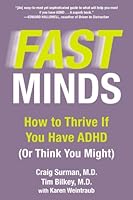Fast Minds
Sticking to these new patterns instead will be self-reinforcing. Each time you succeed, each time you catch yourself at a critical moment and chose a deliberate route rather than a default path, you will get closer to where you want to
Craig Surman, Tim Bilkey, Karen Weintraub • Fast Minds
There are two critical moments for making sure an action item happens: the moment you record it, and the moment you remember that it is time to do it. So planning should include how you will remember to do it—whether it’s regularly checking the schedule or alarm reminders.
Craig Surman, Tim Bilkey, Karen Weintraub • Fast Minds
It takes practice to establish an executive habit—and people with FAST MINDS will always need reminders and extra effort to change behaviors.
Craig Surman, Tim Bilkey, Karen Weintraub • Fast Minds
Multiple studies show that in children and adults with ADHD, the anterior cingulate is less active, smaller, or less connected to other regions.
Craig Surman, Tim Bilkey, Karen Weintraub • Fast Minds
Frontal areas like the prefrontal cortex regulate the ability to organize, plan, and handle change. Another area of brain machinery important for control of behavior that we introduced in Chapter 2, a forward region called the anterior cingulate cortex, may be particularly relevant for determining what the brain engages in at a given moment.
Craig Surman, Tim Bilkey, Karen Weintraub • Fast Minds
If what you are doing matters to you, it will be easier to engage. Knowing what matters to you—what you care about, what you value—can help you see the worth of the hoops you need to jump through to fulfill long-term goals.
Craig Surman, Tim Bilkey, Karen Weintraub • Fast Minds
Is the next step vivid and clear in my mind? Am I internally distracted? (Are thoughts, feelings, or my mental or physical state preoccupying?) Is my environment distracting? (Note sensory and virtual distractions, reminders of other tasks.)
Craig Surman, Tim Bilkey, Karen Weintraub • Fast Minds
adults with ADHD struggled to control how they express their emotions.
Craig Surman, Tim Bilkey, Karen Weintraub • Fast Minds
Three factors commonly impair the operation of our center for planned behavior: lack of clear plans to follow, internal distractions (such as emotions, thoughts, or stress), and external distractions (sounds, sights, or demands from the offices and other environments around us).
